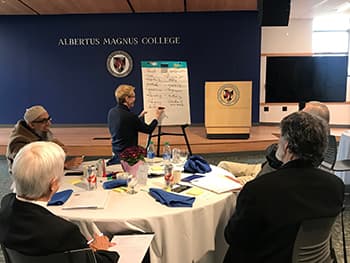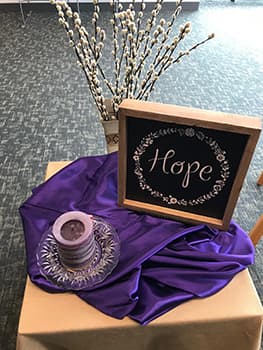Albertus Magnus College Hosts Local Religious Leaders to Discuss Issues of Today
Group Reflects Upon Community Needs Regarding Contemporary Issues, Including Coronavirus
Hope. Trust. Open hearts and open minds. These words of compassion spear-headed the list of answers to the question of “how to live faithfully in these challenging times,” the galvanizing inquiry for an ongoing discussion amongst about a dozen New Haven and Hamden neighborhood religious leaders. At the invitation of Albertus Magnus College President, Marc M. Camille, Ed.D., the group convened March 12 on the Albertus campus for the first of what is planned to be a series of dialogues on how to better serve the faith and spiritual needs of their congregations and of our wider greater New Haven community. During the meeting, the group took part in a webinar hosted by the City of New Haven on how faith communities can best respond to COVID-19 challenges.
The diverse group representing a multitude of faith traditions reflected on how to respond to societal challenges and engage our local community from a theological point-of-view. The conversation took place at the College’s newly renovated Hubert Campus Center, a space devoted to the integration of thought and practice that defines the mission of the almost 95-year-old Catholic, Dominican College.
“The idea for the gathering emerged from my belief that Albertus is uniquely called and positioned to be a source of community building, across religious faith backgrounds,” said Dr. Camille. “The combination of the College’s Dominican, mission-centric values and its unique campus location - sitting at the intersection of New Haven and Hamden neighborhoods whose residents span a broad spectrum economically, culturally, and spiritually – led me to extend the invitation.”
“We have a voice and it’s our responsibility to use it,” shared Rabbi Herbert Brockman, Rabbi Emeritus at the Congregation Mishkan Israel in Hamden. “This gathering is a gift to us and it’s something we want to do more of,” offered Sr. Anne Kilbride, O.P., assistant to the President for Dominican Mission at Albertus Magnus.
Just some of the issues explored in the gathering, which featured small group, theme-based discussions, included how people might lose a sense of faith; how people of faith can find new ways to come together and communicate; and the importance of language and accurate information. Future gatherings with additional participants are planned, as is the possibility of publishing a white paper based on the day’s dialogue.
In addition to Dr. Camille and Sr. Kilbride, Albertus Chaplain Rev. Jordan Lenaghan, O.P., Albertus Assistant Professor of Religious Studies, Dr. Jon Sozek, Rev. Bonita Grubbs, Executive Director of Christian Community Action in New Haven, and Rabbi Emeritus Brockman helped facilitate the day’s events. Also in attendance were Omer Bajwa, Director of Muslim Life in the Chaplain's Office at Yale University; Rev. Canon Barbara Cheney, Missional Priest-in-Charge at St. James Episcopal Church in New Haven; Rev. Dr. Joseph Delahunt, Pastor of First Baptist Church in New Haven; Rev. Ian Oliver, Pastor of the University Church and Senior Associate Chaplain for Protestant Life at Yale University; Rev. Dr. Luk De Volder, Rector of Trinity on the Green (Episcopal) in New Haven; and Rabbi Rona Shapiro, Rabbi at Congregation B'nai Jacob in New Haven.
About Albertus Magnus College
Founded in 1925, Albertus is a coeducational Catholic College in the Dominican tradition. Albertus' values- and liberal arts-based education is recognized by external rankings such as US News & World Report, Money, and The New York Times, and has been named a Top 10 Military Friendly School. For ten consecutive years, at least 95% of Albertus graduates have attained employment or gone on to graduate studies within six months of completing their degrees. The College has an enrollment of approximately 1,300 students across its traditional undergraduate, accelerated adult undergraduate, and graduate program levels. Proud to enroll a student body where nearly half of its undergraduate students receive Federal Pell Grants and are first-generation college goers, Albertus is known for its innovative curricular offerings, recently launching new Bachelor's degree programs in Nursing, including BSN and Connecticut's first LPN-to-BSN; General Health Sciences; Interdisciplinary Studies; and Public Health.
Among its graduate offerings is the State of Connecticut's only Master of Arts in Art Therapy and Counseling program, and it is just one of three schools to offer a Master of Science in Human Services. In 2025-26, Albertus is celebrating its historic 100th Anniversary and completing implementation of the Albertus 2025: Lighting the Way to a Second Century strategic plan, with a bold vision to "be a destination liberal arts-based college, distinguished in its interdisciplinary and experiential approach to education, rooted in Dominican values, that prepares students for lifelong civic engagement and success." To learn more, please visit albertus.edu.


